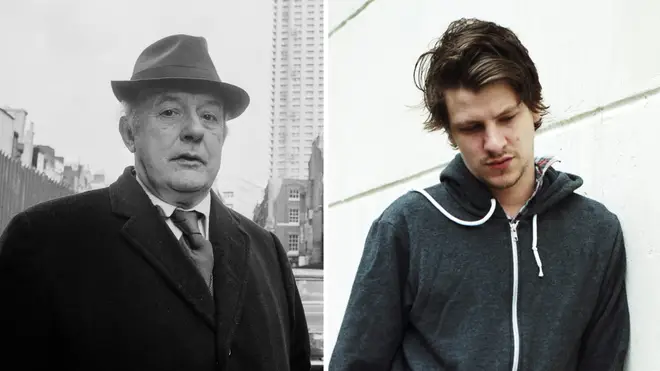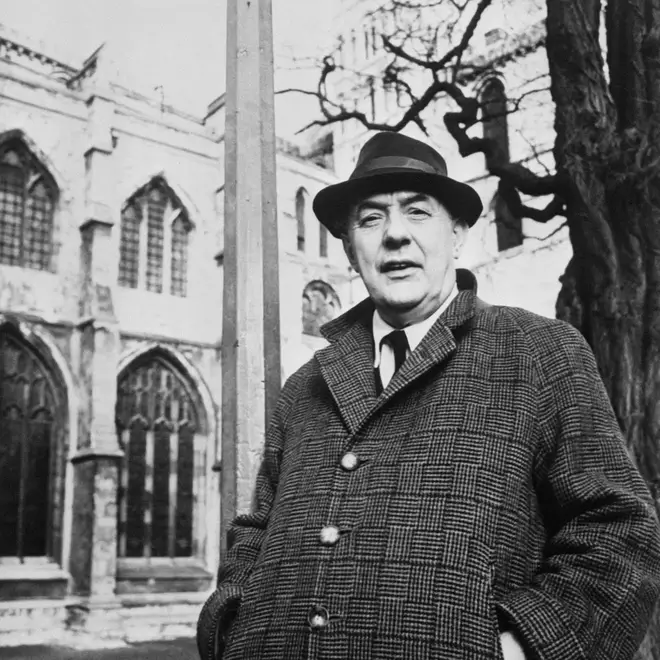On Air Now
Radio X Chilled with Sarah Gosling 10pm - 1am
30 June 2023, 14:48

The classic 2007 tune features the voice of poet Sir John Betjeman... but the story isn't as straightforward as you think.
Jamie Treays has been making music since he was 19 years old. His first releases were a series of EPs including Betty & The Selfish Sons, which showcases early tunes like Salvador and Back In The Game.
The first "proper" Jamie T single was the much-loved Sheila, released on 29 July 2006 via Virgin Records. It's a dark tale of real life in London, which sees the title character drunkenly meeting her doom in the river, Jack 'The Crackaman' losing out to rival drug lords and an addict called Georgina who overdoses: "Another sad story, that's tragedy."

Jamie T - Sheila (Official Video)
The song opens with the chorus and this then followed by an elderly man's voice intoning the following verse:
"Oh when my love, my darling,
You've left me here alone,
I'll walk the streets of London
Which once seemed all our own.
The vast suburban churches
Together we have found:
The ones which smelt of gaslight
The ones in incense drown'd"
The poem is called The Cockney Amorist and was written by Sir John Betjeman for the New Yorker magazine in 1958 and subsequently published in his book High And Low, then later in his Collected Poems. The sample used on Sheila is read by none other than Betjeman himself.
The recording of The Cockney Amorist is taken from Betjeman's own album Banana Blush, released on the Charisma label (also home to Genesis and Monty Python) in 1974. Have a listen to the original here:

The Cockney Amorist
Jamie T used Betjeman's lines in Sheila because his family had a copy of Banana Blush in the house - the poem tells of a widowed man walking around his old haunts in London, alone. The sad but finely-observed words echo the ones used by Treays in Sheila.
The poem ends:
"I love you, oh my darling,
And what I can't make out
Is why since you have left me
I'm somehow still about."

Betjeman was Poet Laureate from 1972 until he died, aged 77 on 19 May 1984. His dourly humorous work was frequently heard on television and radio and David Brent had a pop at his most famous poem in The Office for slagging off his home town:
"Come, friendly bombs, and fall on Slough!
It isn't fit for humans now."

Slough by John Betjemann (read by E. Rigsson)
The other voice heard in Sheila is often attributed to Betjeman's reading of The Cockney Amorist, but this isn't correct...
These lines don't appear in The Cockney Amorist - or, indeed, anywhere else on the Banana Blush album. So where did they come from?
The line is very similar to one sung by Rex Harrison in the film musical My Fair Lady. The movie version of George Bernard Shaw's play Pygmalion, the story features Professor Henry Higgins undertaking a bet that he couldn't take the most working class person he can find and "refine" them, so they can mingle freely in high society.
Higgins comes across a common Cockney flower seller called Eliza Doolittle (played by Audrey Hepburn) and declares (somewhat harshly) to his colleague:
"By rights, she should be taken out and hung,
For the cold-blooded murder of the English tongue!"

My Fair Lady - Why Can't The English?
Of course, Higgins is proved right as Eliza learns the ways of the upper classes... for a while. My Fair Lady was a huge hit on its release in 1964, adapted from Alan Jay Lerner and Frederick Loewe's Broadway smash.
The voice on Sheila is definitely NOT Rex Harrison from the film and we used to strongly suspect that it's Mr Jamie Treays himself reading the line.
However, we can finally confirm that it IS a Mr. Treays on the track... just not the one you think.
"That is my dad," he revealed to Radio X. "It was originally a sample from a very famous musical and I couldn't use it, so that is my dad."
And while the words are forever immortalised in his hit single, it turns out there was a lot less pomp and ceremony to the recording of the part, with Jamie simply dragging his very unimpressed father upstairs to record it in his room.
"He was downstairs, so I just got my Dad upstairs - as angry as he was to be disturbed - he came upstairs and [is] forever immortalised sounding annoyed."
Watch our interview with Jamie T himself here:

Jamie T is back after six years!
Finally, let's not forget that the official video for Sheila featured another British icon: the late Bob Hoskins, who lip-synced to Jamie T's voice.
What a lot of history in just one song.
READ MORE: Jamie T talks new music and reveals what he's been up to on his six year hiatus